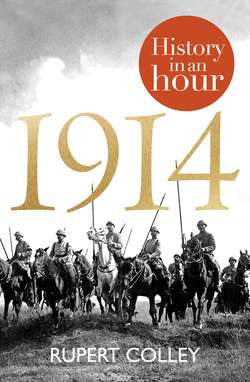Читать книгу 1914: History in an Hour - Rupert Colley - Страница 7
Assassination of an Archduke
ОглавлениеFollowing his father’s death in 1896, Franz Ferdinand found himself next in line to the Austro-Hungarian throne. His relationship with his uncle, the emperor, was fractious and was not helped when, in 1900, he insisted on marrying a commoner, Sophie, Duchess of Hohenberg. Franz Ferdinand got his own way but at a price, having had to sign away the right of any future sons in succeeding him, and agree that Sophie – as a non-royal – would never become empress. To add to the indignity, Sophie was barred from attending royal occasions. The only exception was in regard to the archduke’s position as field marshal when, acting under his military capacity, he was allowed to have his wife at his side.
And so it was that Franz Ferdinand, together with his wife, arrived in Sarajevo, capital of Bosnia, to inspect the troops on Sunday, 28 June 1914. The date was also a significant day for Serbia – it was their national holiday and the anniversary of the 1389 Battle of Kosovo, when an invading army of Ottomans inflicted a defeat on the Serbian nation, which, 525 years later, still held an important place in the Serb identity. Franz Ferdinand’s visit was, for the Serbian nationalists, the ideal occasion to use terror as a form of protest against Habsburg rule. An organization called the Black Hand, sometimes known as ‘Union or Death’, prepared accordingly. The leader of the Black Hand had written two years previously that ‘If Serbia wants to live in honour, she can only do this by war’, referring to the Habsburg Empire as ‘aliens from the north’.
Moments before: the assassination of Franz Ferdinand and his wife, 28 June 1914
As the archduke’s procession of open-top cars passed slowly down the city’s main avenue, six members of the Black Hand joined the crowds, each armed with a bomb, a revolver and, in the case of capture, a vial of cyanide. Among them was 19-year-old Gavrilo Princip. It was eleven in the morning. The first of Princip’s colleagues lining the route lost his nerve, but another held his and threw his bomb before jumping in the river where he was soon caught and arrested. The bomb fell on to the back of Franz Ferdinand’s car, bounced off and landed beneath the vehicle following and exploded, injuring twenty people but not the archduke or his wife. Disheartened by the failure, Princip trudged to a nearby tavern.
Franz Ferdinand, unsurprisingly, was not impressed. On arriving, as planned, at the City Hall, he complained to the city mayor, ‘Mr Mayor, I come to Sarajevo on a visit, and I get bombs thrown at me. It is outrageous.’ Then, in delivering a speech, he ended with the words, ‘I see in [the people of Sarajevo] an expression of joy at the failure of the attempt at assassination.’
Arrest of Gavrilo Princip following his assassination of Franz Ferdinand
Later in the day, on the duchess’s suggestion, Franz Ferdinand declared his wish to visit the injured lying in hospital. On leaving the hospital, his chauffeur, unfamiliar with this part of the city, turned down a one-way street (which was ironically named after the emperor, Franz Josef). On realizing his mistake, the chauffeur tried to reverse but stalled next to the tavern where Princip was still cursing his bad luck. On seeing the royal car in front of him, Princip leapt on to its running board, drew his revolver and fired. The first bullet killed the duchess instantaneously. ‘Sophie, don’t die,’ cried the archduke. ‘Stay alive for the children.’ The second bullet caught him in the throat. As the car rushed to the governor’s residence, a member of his entourage asked him if he was in great pain, to which the archduke replied several times, ‘It is nothing’, before expiring. Princip was wrestled to the ground, his revolver snatched from his hand. He managed to swallow the cyanide but the poison, being so old, had no effect.
Austria-Hungary reeled in shock: the heir to the throne was dead, killed by Serbian terrorists. There were anti-Serb riots in Vienna. For the Austro-Hungarian government, it provided the perfect pretext to enforce its authority on its Slav neighbour. It was too good an opportunity to miss.
The assassination of Franz Ferdinand brought a premature end to the 1914 Kiel Regatta. Although Germany and Britain may have been in the midst of a naval arms race, a fleet of British ships, having been invited, attended the annual celebrations in Germany. British and German officers traded compliments on their respective ships, abiding by an unspoken rule not to ask too many searching questions of each other. Wilhelm, dressed in the uniform of a British Admiral of the Fleet, was guest of honour aboard the British dreadnought, the King George V, signing its visitors’ book and being taken on a tour. On the afternoon of 28 June, Wilhelm was racing his yacht, Meteor, pitting his sailing skills in an Anglo-German yacht race. A telegram arrived. Folded in a cigarette case, it was tossed over to the Kaiser. Written by the archduke’s chauffeur, it made for grim reading. The Kaiser’s friend, Franz Ferdinand, whom he had visited only a fortnight before, had been assassinated. The yacht race was aborted; the party was over.
